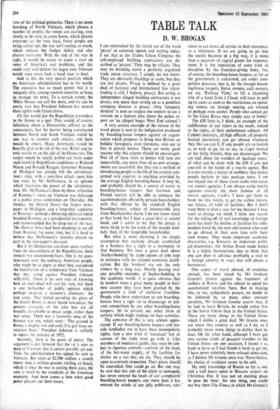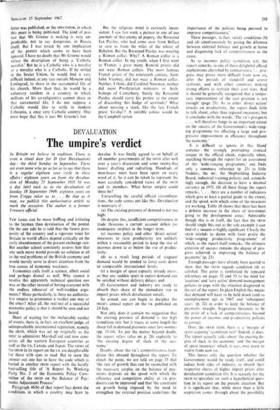TABLE TALK
D. W. BROGAN
I am entertained by the lavish use of the word `pirate' in common speech and writing today. I see that at the Trades Union Congress the self-employed building contractors are de- scribed as 'pirates.' They may be villains They may be breaking down a perfectly organised trade union structure. I simply do not know. They are obviously blacklegs or scabs, but they are not pirates. Piracy is defined by a great deal of national and international law (slave- trading is still, I believe, piracy). But acting as independent alleged building contractors is not piracy, any more than setting up as a penniless company director is piracy. (Any 'company director' is now so suspect one expects to see a version on a famous joke about the police re- port on 'an alleged bogus West End colonel.') A very serious example of the misuse of the word pirate is seen in the indignation produced by boarding-house keepers against an organi- sation which proposes to bring into Britain on holiday foreigners, even Germans, who are to live in private houses. There are many good reasons why this scheme should be encouraged. Not all of these visits to homes will. turn out successfully, any more than all au pair arrange- ments are successful; but they are a method of introducing people to the life of the country con- cerned very superior to anything provided by the average English boarding-house. It may be, and probably should be, a source of worry to boarding-house keepers that German and , French tourists will be able to compare the accommodation offered by private householders with that offered by the standard English boarding-house, subject of innumerable jests from Beachcomber down. I do not know much at first hand, but I hear a great deal at second hand, and it seems to me that the piracy is more likely to be the work of the seaside land- lady than of the hospitable householder.
But what is more alarming is the simple assumption that anybody already established in a business has a right to a monopoly in that business. We hear a great deal about 'feather-bedding' by trade unions of jobs kept in exigence with no rational economic justifi- cation. But the 'workers' are not the only sinners by a long way. Hastily passing over any possible examples of feather-bedding, in the academic world, it is quite obvious that in modern times a great many people in busi- ness assume they have been granted by the government a kind of exclusive franchise. People wllo have undertaken to run boarding- houses have a right (a) to discourage or pre- vent competition by any other boarding-house keepers; (b) to prevent any other form of activity which might impinge on their activities.
The converse of this is very seldom appre- ciated. If our boarding-house keepers and sea- side landladies are to have these monopolistic rights, then a new kind of 'merchant' law or custom of the trade must go with it. Like members of mediaeval guilds, they must be sub- ject to rigorous controls—controls of the food, of the hot-water supply, of the facilities for Shelter on a wet day, etc etc. They should be open to constant inspection. Their prices should be controlled. One could go on. But one may be sure that this side of the claim to monopoly has never entered the heads of our complacent boarding-house keepers, any- more than it has entered the minds of our jolly publicans, who claim to cut down all service to their customers to a minimum. If we are going to go into the tourist business in a big way, it is more than a question of capital grants for improve- ment. It is the imposition of some kind of discipline by the franchise-giving body, for, of course, the boarding-house keepers, as far as the government is concerned, are under com- petitive pressure, that is, by the foreign board- ing-house keepers, bistro owners, cafe owners, etc etc. 'Railway View,' to lift a charming title of a hotel from 1 Claud; will have to pull up its socks as soon as the restrictions on spend- ing money on foreign touring are relaxed or perhaps even sooner. People who cannot get to the Costa Brava may simply stay at. home!
The £50 limit is, I think, an example of the indifference of our rulers to the needs, indeed to the rights, of their unfortunate subjects. All Cabinet ministers, all high officials, all properly backed journalists, can get abroad whenever they like (so can I). If any people are so foolish as to wish to go, let us say, to Capri instead of the Scilly Islands, they are discouraged. We are told about the wonders of 'package tours,' of what can be done with the £50 if you put yourself in the hands of a tourist agency. But it is not merely a matter of snobbery that makes people hesitate to take package tours. I am not myself one of those travel snobs who never use tourist agencies. I am always using tourist agencies—usually the most famous of all tourist agencies, Cook's. I have got them to book me into hotels, to get me airline tickets, sea tickets, all kind of facilities. But I don't. want them to plan a tour for me, because 1 may want to change my mind. I think one reason for the falling-off of real knowledge of foreign parts has been the decline in facilities for inde- pendent travel by the men and. women who used- to go abroad in their own time with their own money. They made important academic discoveries, e.g. Knossos, or important politi- cal discoveries. (Sir Arthur Evans made both.) It is a highly bureaucratic idea to think that one can plan in advance profitably a visit to a foreign country in ways that will please a bureaucrat.
One aspect of travel abroad, of residence abroad, has been raised by Mr Graham Greene's protest against the treatment of authors in Russia and his refusal to spend his accumulated royalties there. But in• making this, to me, sympathetic protest, no doubt to be followed by so many other eminent novelists, Mr Graham Greene asserts that, if he had to leave Britain, he would rather live in the Soviet Union than in the United States. There are many things in the United States which I dislike a great deal. Mr Greene does not know that country as well as I do, so I probably know more things to dislike than he does. On the other hand, although I have got into various kinds of passport troubles in the United States (on one occasion, I found it as hard to leave as I had found it hard to get in), I have never definitely been refused admission, as I believe Mr Greene once was. Nevertheless, his choice of residence seems to be odd.
My only knowledge of Russia so far is one and a half hours spent in Moscow airport on Christmas Eve. It was not -an exciting place to pass the time: for one thing, one could not buy there The Times, in which Mr Greene's letter was published, or the SPECTATOR, in which this piece is being published. The kind of pro- test that Mr Greene is making is very un- profitable, not to say dangerous, in Russia itself. But I was struck by one implication of the protest which seems to have been ignored. I have no doubt that Mr Greene would refuse the description of being a 'Catholic novelist.' But he is a Catholic who is a novelist or a novelist who is a Catholic. If he settled in the Soviet Union, he would find it very difficult indeed, at any rate outside Moscow and Leningrad, to share in the sacramental life of his church. More than that, he would be a voluntary resident in a country in which millions of his co-religionists cannot share in that sacramental life. I do not suppose a Catholic would like to settle in modern Lithuania, a once very Catholic country. One must hope that this is just Mr Greene's fun. But the religious mind is curiously incon- sistent. I saw last week a picture in one of our journals of that enemy of popery, the Reverend Ian Paisley, who had come over from Belfast to save us from the wiles of the whore of Babylon. But the Reverend Paisley was wearing a Roman collar. Why? A Roman collar is a Roman collar. In my youth, when I first went to France, a great many Romish priests did not wear Roman collars. The most famous French priest of the nineteenth century, Saint John Vianney, did not wear a Roman collar. Neither, I think, did Cardinal Newman; neither did most Presbyterian ministers or Arch- bishops of Canterbury. Surely the Reverend Paisley should carry his protest to the extent of discarding this badge of servitude? What about wearing a stock, like the late French priest 'Grabat'? A suitable colour would be the Campbell tartan.































 Previous page
Previous page